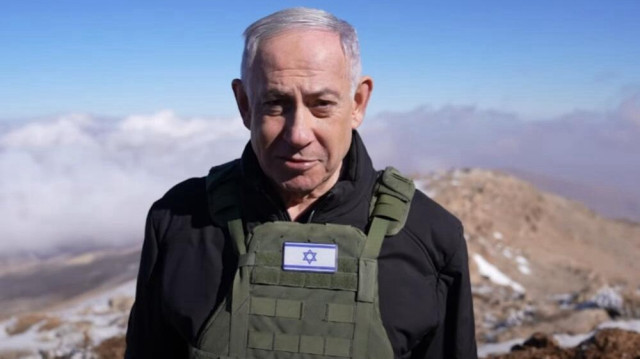On December 17, 2024, Prime Minister of Israel Benjamin Netanyahu reaffirmed Israel’s continued military presence in Syria’s Golan Heights, underscoring the strategic importance of the region for Israeli security. During a high-level military assessment held on the peak of Mount Hermon, also known as Jabal al-Sheikh, Netanyahu declared that Israeli forces will remain stationed in the area “until another arrangement is found that ensures Israel’s security.”
Military Presence in the Golan Heights
The Golan Heights, a region Israel has occupied since the 1967 Middle East War, has been a source of ongoing tension between Israel and Syria. In his statement, Netanyahu emphasized that the meeting, which included Defense Minister Yoav Katz, Chief of Staff Herzl Halevi, and other senior military officials, was focused on reviewing the Israeli Defense Forces (IDF) deployments and determining the future course of action for the region.
“We are holding this assessment in order to decide on the deployment of the IDF in this important place until another arrangement is found,” a statement from Netanyahu’s office clarified. The remarks suggest that Israel does not foresee a change in its control over the Golan Heights in the immediate future, as the region continues to hold military and strategic significance, particularly in terms of its vantage point over Syria and Lebanon.
The Strategic Importance of Mount Hermon
Mount Hermon, which stands at an elevation of 2,800 meters, holds significant strategic value. The mountain’s peak provides a commanding view of Damascus, Syria’s capital, making it a critical location for Israeli surveillance and military operations. Following an uptick in hostilities and airstrikes across Syria, Netanyahu’s assessment of IDF deployment on Mount Hermon reflects a broader Israeli effort to secure its borders and maintain an upper hand in the region. This heightened military presence comes as tensions in Syria continue to evolve, particularly after the ousting of the Bashar al-Assad regime by anti-government forces on December 8, 2024.
In his remarks, Israeli Defense Minister Katz reiterated the importance of maintaining a presence on Mount Hermon during the winter months. Katz ordered the IDF to prepare for an extended deployment in the region, signaling Israel’s commitment to keeping a strong military foothold in the Golan Heights amid the shifting dynamics of the Syrian conflict.
The Collapse of the 1974 Disengagement Agreement
Israel’s recent moves also coincide with its declaration that the 1974 Disengagement Agreement with Syria, which established a demilitarized zone in the Golan Heights, has effectively collapsed. This agreement, which aimed to reduce the risk of direct military conflict between the two nations, had held for decades. However, following recent developments in Syria, Israel has deployed forces into the buffer zone, a move that has been widely condemned by the United Nations and several Arab nations, including Syria.
The Israeli military’s presence in the once-demilitarized zone has raised alarms about the potential for further escalation. The Golan Heights remains a highly contentious area, and Israel’s actions in the region are likely to provoke stronger reactions from Syria and its allies, particularly in light of the complex geopolitical situation in the broader Middle East.
A Strategic Gamble?
Netanyahu’s insistence on maintaining Israel’s hold over the Golan Heights comes at a time when the region is in flux, with the Syrian civil war and shifting alliances contributing to an increasingly volatile environment. As Israel continues to assert its control, questions remain about the long-term implications of such a stance, not only for Israel-Syria relations but also for broader Middle Eastern stability.
The coming months will likely see continued Israeli efforts to solidify its position in the Golan Heights, especially as the Syrian conflict unfolds. How Syria, the international community, and neighboring Arab nations respond will play a significant role in shaping the future of the Golan Heights and its place in the ever-evolving Middle East geopolitical landscape.
Related Stories:
Israel approves plan to surge settler population in occupied Golan Heights
Germany urges Israel to ‘abandon’ plan for more Golan Heights settlements
U.N. calls on Israel to stop bombing Syria and occupying demilitarized zone
















